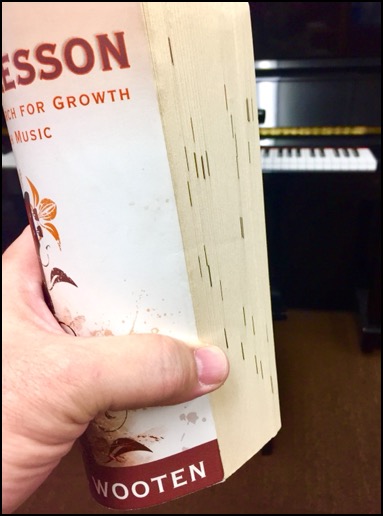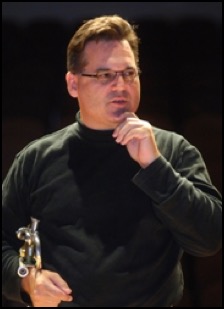Victor Wooten
The Music Lesson
22/01/17 Filed in: Review

The Music Lesson by Victor Wooten sat on my books-to-read shelf for a number of years, in part because I was not confident that a jazz bass player had much to teach me, a classical trumpeter. Turns out he has quite a lot to teach me and I have been kicking myself for not reading the book and implementing its lessons sooner. Hopefully the excerpts below will convince you to start reading today.
From The Music Lesson:
I play Music, not instruments. . .you are just a bass player. That means you play bass guitar. A true musician. . .plays Music and uses particular instruments as tools to do so. I know that Music is inside me not inside the instrument. This understanding allows me to use any instrument, or no instrument at all, to play my Music.
A true writer can write using a typewriter, a pen, a pencil or anything else that he chooses. You wouldn’t call him a pencil writer would you? Your understanding that the writing utensil is just a tool allows you to see past it and into the truth of what he is--a writer. The story is in the writer, is it not? Or is it in the pencil? Your problem is this: you have been trying to tell your story with a bass guitar instead of through it. Page 19
You should find the groove before you start playing. It doesn’t matter whether you know the song or not. If you need to, let a few measures go by while you figure out what the groove is saying. Once you find the groove, it doesn’t matter what note comes out; it will ‘feel’ right to the listener. People generally feel Music before they listen to it anyway. Page 31
Never loose the groove in order to find a note. Page 33
If you listen closely, you can find a whole world living inside each note. Notes are alive, and like you and me, they need to breathe. Page 59
Beauty is something you experience, not something you prove. Can you tell me what beauty is, or can you only give me your perspective on it? Can science define beauty? Can you see or touch it, or can you just see and touch something that possesses its quality? Beauty is invisible, individual, and intangible. Interesting isn’t it? It is something you know, yet technically, it is not there. How can this be? Like Music, it lives inside you, and you impress its qualities on whatever you choose. Page 73
Your technique should be at such a high level that you can forget about it. Eventually you will even forget about your bass. Only then can you remember how to play Music. Think about talking. When you talk, the words are your notes. Your tongue, diaphragm, mouth, teeth, lips and so on are you instruments. How you use them to push air across your vocal cords and through your lips to form works is your technique, but you rarely think about that. When you were a baby your technique was not adequate enough to allow you to speak like everyone else. You would babble on and on trying to work it our and be understood. Not having the proper control of your instrument caused you to cry. After many months you finally developed the control allowing you to say the things you wanted to say. That made you happy. The feeling of joy encouraged you to learn more. Page 78-79
I have been warming up my whole Life for this gig. . . All the previous gigs were just rehearsals for tonight. It all leads to now. Page 133
Music is played from the mind, not the body. So do whatever you can to exercise your mind. Page 158
There is only one reason that you ever fail at anything, and that is because you eventually change your mind. Anything and everything you have ever decided to do, you have succeeded, or will succeed, at doing. It may take you a day, a year, or twelve lifetimes, but if you hold your mind affixed on the idea, it will come forth. Page 183-184
Your life is made up of a string of many different phrases. Most of these phrases were put together unconsciously. Now that you realize you only have a matter of days on this planet, it may be wise for you to start living consciously. The choice is always yours. Page 184-185
Most people work with their minds, when playing with them can be so much more effective. Page 233
All experiences as well as all Music are ordinary. It is up to you to add the ‘extra’ quality that makes something ‘extraordinary.’ But like most humans, you risk missing much of the present by putting part of yourself in future or past experiences. Page 242
My new found listening skill was one most other musicians neglected. It wasn’t that they couldn’t listen as well as I could; they just didn’t. I noticed that most musicians seemed to reserve their ears for themselves rather than open up their ears to the rest of the band. I found that when I listened to the other musicians more than I listened to myself, I played better. I realize that listening is a choice. The same is true in conversation. When I listen to other people more that to myself, I know how to respond and support them in a a better way. It also helps me know when to remain quiet. Page 244-245

I like to mark passages with important concepts so that I can refer to them quickly. I have never before marked so many passages in one book.
